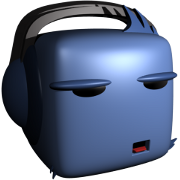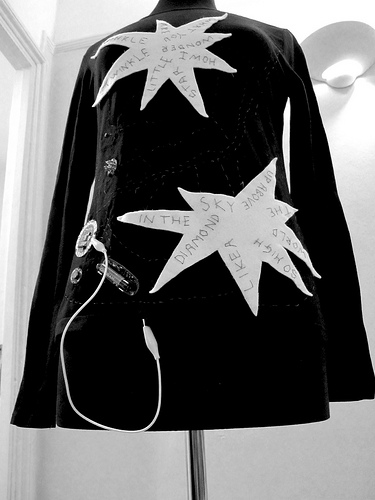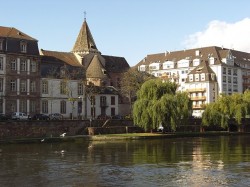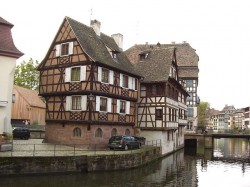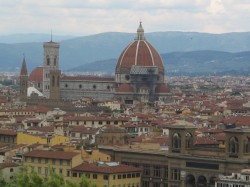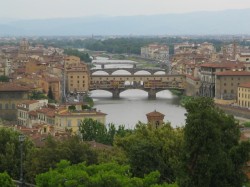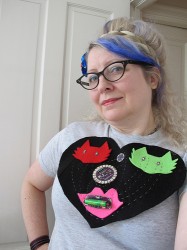 Whenever you go to MakerFaire, Dorkbot London meetings, OpenTech, you will be very unlucky not to meet Rain Ashford. Rain is the prime example of a Maker – using technology to fulfil her creative talent, sharing her knowledge, boosting people’s confidence. She always has time to help – she took time to answer my questions.
Whenever you go to MakerFaire, Dorkbot London meetings, OpenTech, you will be very unlucky not to meet Rain Ashford. Rain is the prime example of a Maker – using technology to fulfil her creative talent, sharing her knowledge, boosting people’s confidence. She always has time to help – she took time to answer my questions.
What is your background?
At university, I studied Fine Art, followed by Multimedia. After university I moved to London and after a few months working at a digital agency, I took a post at the BBC, where I stayed for 11 years.
When did you start playing with electronics?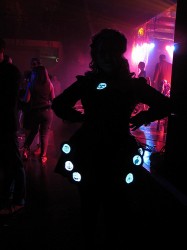
I initially experimented with pulling computers and peripherals apart at a women run technology initiative called Genderchangers that visited Limehouse Town Hall (home of dorkbot London) in about 2002, but discovered microcontrollers in 2008 when a friend gave me an Arduino to play with. After some small and joyous success playing with code, a breadboard and LEDs, I began to look at what else I could do with this technology. This led me to experiment with the mbed and then the sewable LilyPad Arduino microcontrollers.
You held several positions at the BBC. What were they?
I worked my way up from Web Assistant to Senior Producer, working on many of the BBC’s high profile websites, interactive activities and campaigns, from educational areas such as Arts and Learning, to live TV websites Watchdog and Crimewatch, and also Entertainment sites. I also worked for BBC R&D as a Technologist, co-running BBC Backstage, which was the BBC’s initiative to open up content, plus it was also a platform and community for developers both inside and outside the BBC. Whilst at R&D I also worked on RDTV, a groundbreaking project which piloted a series of technology interviews, but also released all the components of the interviews, such as the rushes, graphics and scripts to the public to remix.
Which position(s) influenced you most and made you what you are now?
I’m a mix of the various attributes from each of the roles I have had, for example, my ‘producer’ side is adept at organising, strategy and project management, where as my ‘technologist’ side is geeky, creative and considers technical aspects of my projects.
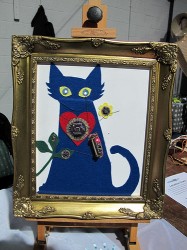 I understand that you have gone back to college – can you tell us about the course?
I understand that you have gone back to college – can you tell us about the course?
I’m doing a 1-year electronics engineering course, plus a course in C programming. I’m doing these to help me build, code and test bigger and better wearable technology and artworks. I’m learning loads and really enjoying being back in education.
At Maker Faire and OpenTech you displayed and created great things with electronics and diverse materials. What do you do with these pieces? Do you sell them?
I’m building up my portfolio, so have been keeping my most recent wearable technology and electronic artworks for exhibitions and talks, but I’m also available for commission to make bespoke pieces and tech consultancy.
Throughout the world, we can see more and more hackspaces, dorkbots etc. What do you think created that movement? What needs do they fulfil?
Well, dorkbot London (whose tag line “doing strange things with electricity” says it all) has been a lynchpin and inspiration to my geekery for nearly 10 years now. I feel communities such as Hackspaces are growing out of frustration against technology companies creating products that are ever more closed and locked down to their users, plus tech that has a short or throwaway life expectancy before the next upgrade comes out. People from various backgrounds and experience of arts, crafts and sciences are setting up spaces so that they can have access to decent machines and tools, and also to share skills and ideas. People are also experimenting with open source ideals, helping each other and experimenting with different mediums in new ways – the plethora of online communities and inventors creating affordable technologies for many to enjoy has brought various communities together to create some fantastic projects.
What do you think is the spirit of the Maker community?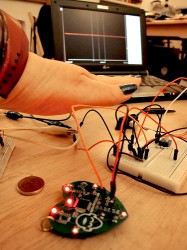
I think it’s sharing knowledge and having fun making stuff as a community. The Makers are the same people who attend the Hackspaces, Hackdays and dorkbots around the globe – people are very friendly, helpful and willing to share – there is a lot of crossover between the various communities and events.
Unfortunately, we all have to earn a living can your creations be enough to do so?
I’d like to hope so, but we’ll see. I do believe that wearable technology is the future – as ubiquitous computing gets smaller and converges with other lifestyle, medical and entertainment technologies, I think we’ll soon be getting used to it literally creeping into our clothes and I want to be one of the engineers designing and making this technology!
How do you see the future and in particular your future?
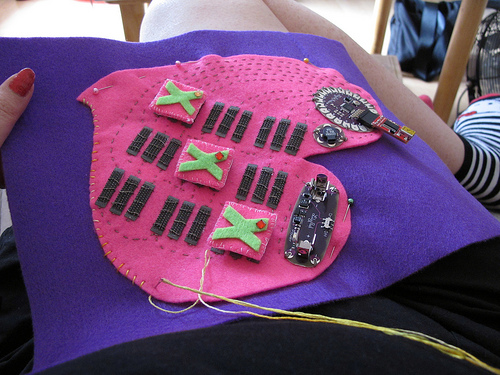 I see my future as less corporate and more fun! But as I mentioned above, I am putting my money on wearable technology and e-textiles becoming an essential part of the future. In terms of how, I feel that this could be by sensoring and monitoring technology getting smaller and more comfortable to wear with everyday garments, such as underwear, skirts, trousers, tops, etc and also advances in e-textiles. Uses for wearable technology are multiple, from sports, medical, lifestyle and vocational wear. An example of this could be simple, but reliable sensors that feedback medical data. For those who need their health monitoring, a non-invasive solution could give people independence from hospitals so that they could live at home or take holidays, with the reassurance of knowing that their doctors or carers will be able to keep track of their health remotely. Another big area for wearable tech is sports and personal tracking, where athletes, coaches and the viewing audience want precise performance data and also live images and sounds of an experience or event as it’s happening. In performance, many theatre and dance productions are using tech in their costumes already, for example Lady Gaga is a prolific user. Space, military and the needs of those working in extreme environments are also pushing the development of wearable technology.
I see my future as less corporate and more fun! But as I mentioned above, I am putting my money on wearable technology and e-textiles becoming an essential part of the future. In terms of how, I feel that this could be by sensoring and monitoring technology getting smaller and more comfortable to wear with everyday garments, such as underwear, skirts, trousers, tops, etc and also advances in e-textiles. Uses for wearable technology are multiple, from sports, medical, lifestyle and vocational wear. An example of this could be simple, but reliable sensors that feedback medical data. For those who need their health monitoring, a non-invasive solution could give people independence from hospitals so that they could live at home or take holidays, with the reassurance of knowing that their doctors or carers will be able to keep track of their health remotely. Another big area for wearable tech is sports and personal tracking, where athletes, coaches and the viewing audience want precise performance data and also live images and sounds of an experience or event as it’s happening. In performance, many theatre and dance productions are using tech in their costumes already, for example Lady Gaga is a prolific user. Space, military and the needs of those working in extreme environments are also pushing the development of wearable technology.
Thank you Rain.
Some of Rain’s work:
For more information, read her blogs:
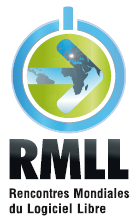 The Rencontres Mondiales du Logiciel Libre (RMLL, Libre Software Meeting) are a yearly event where all actors of FLOSS from all around the world can gather, discuss, and work on software, but also on other topics such as art, law or health. It was created in Bordeaux by the local LUG in 2000 and has been held in a new town every year since then. This year, Strasbourg will be hosting the event from 9th to 14th of July. There will be 13 tracks, which means ca. 250 talks and workshops, given by people from 22 countries, with 3 keynotes:
The Rencontres Mondiales du Logiciel Libre (RMLL, Libre Software Meeting) are a yearly event where all actors of FLOSS from all around the world can gather, discuss, and work on software, but also on other topics such as art, law or health. It was created in Bordeaux by the local LUG in 2000 and has been held in a new town every year since then. This year, Strasbourg will be hosting the event from 9th to 14th of July. There will be 13 tracks, which means ca. 250 talks and workshops, given by people from 22 countries, with 3 keynotes:
- Richard Stallman is coming from the USA to tell us about the history and philosophy of Free Software
- Pr Ratib is coming from Switzerland to tell us about OsiriX, a 3d and 4d image viewer used in hospitals
- Mishi Choudhary is coming from India and presenting “Free Software Globalization : Freeing Societies”
Schedule is being regularly updated.
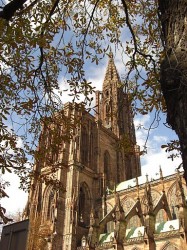 Developers, users, translators, or any other kind of contributors… at least 4000 of them are expected. Besides the talks, visitors will be able to enjoy the village with up to 70 booths held by project representatives, which is a great opportunity to finally meet the people behind that piece of software that you really like and use everyday.
Developers, users, translators, or any other kind of contributors… at least 4000 of them are expected. Besides the talks, visitors will be able to enjoy the village with up to 70 booths held by project representatives, which is a great opportunity to finally meet the people behind that piece of software that you really like and use everyday.
Alongside the conference, a festival of free digital arts will be held where people will be able to enjoy music, video, and live coding, while drinking free (as in speech) beer that has been brewed especially for the event. For spouses and those who would like to take a break, visits to the cathedral and the old wine cellar of the hospital will be organised. Also make sure you get your ticket for the banquet on Wednesday the 13th.
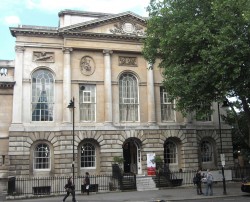 Everything is OTP – this is the big thing. We do not talk about Erlang anymore but Erlang/OTP. Is it a standard library like cpan? Somebody (a perl programmer from Amsterdam who does not work for booking.com) did try to explain it to me but I got confused so you will have to find your own explanation or read a little further.
Everything is OTP – this is the big thing. We do not talk about Erlang anymore but Erlang/OTP. Is it a standard library like cpan? Somebody (a perl programmer from Amsterdam who does not work for booking.com) did try to explain it to me but I got confused so you will have to find your own explanation or read a little further.
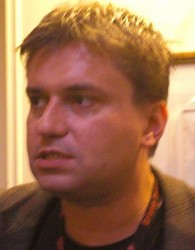
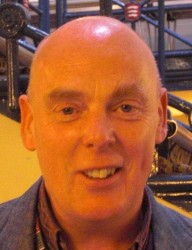 It is always nice to meet Francesco and Simon, authors of our Erlang Programming book. Poor Francesco spent even more time telling me what OTP was. OTP (open telecom platform) = tools, libraries and design principles – the middleware used in systems which never stop. Simon got away lightly, we just talked about education in the UK and France, always a very interesting topic.
It is always nice to meet Francesco and Simon, authors of our Erlang Programming book. Poor Francesco spent even more time telling me what OTP was. OTP (open telecom platform) = tools, libraries and design principles – the middleware used in systems which never stop. Simon got away lightly, we just talked about education in the UK and France, always a very interesting topic.
I also met Joe Armstrong, famous for his Programming Erlang book, 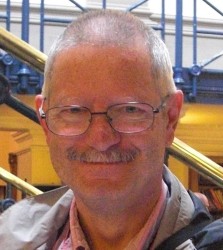 published by Pragmatic Bookshelf. Joe always acts as the grumpy old man – very funny if you do not take him too seriously. His friends describe him as extremely enthusiastic, full of energy and plenty of ideas. He is often referred to as the father of Erlang.
published by Pragmatic Bookshelf. Joe always acts as the grumpy old man – very funny if you do not take him too seriously. His friends describe him as extremely enthusiastic, full of energy and plenty of ideas. He is often referred to as the father of Erlang.
I forgot to mention the erlounge. When you think all the talks are finished, you are invited to spend your drink vouchers at the bar, network and listen to the lightning talks. There might be a few headaches the next day!
Erlang Factory is the gathering of 150 people coming from every corner of the world (18 countries) with 3 days of Erlang University and 2 days of intense talks.
What is it?
The Erlang Factory London 2011 incorporates the Erlang University, during which several training courses are offered, and the Erlang Factory Conference.
This year’s Erlang Factory Conference takes place on 9 and 10 June at The Old Sessions House, in the heart of the city of London. It offers attendees the opportunity to see how companies such as AOL, Yahoo!, Heroku, Basho and Ericsson are using Erlang.
There are over 50 speakers, including Robert Virding and Mike Williams, inventors of Erlang, Kostis Sagonas, the leader of the HIPE Team at Uppsala University, Marcus Kern, CTO at MIG, Steve Vinoski, distributed systems expert and Scott Lystig Fritchie, senior software engineer at Basho Technologies.
- The list of speakers
- This year’s talks
- The full programme
There are three tracks on each day. Day 1 has Case Studies in Gaming and Messaging, Erlang and Test-Driven Development and Cool Tools and Gadgets. Day 2 has Erlang In Databases and Give Me a Break from Erlang, a Business track and a Case Studies track.
Highlights
The Erlounge at the Erlang Factory is open to anybody who is interested in Erlang, not only delegates from the Erlang Factory. Members of the London Erlang User Group are especially welcome.
Attending is free, but to allow us to plan, you have to register with Erlang Solutions.
The Erlounge takes place on 9 June 2011, starting at 18.30 (with food being served at 19.00). There will then be “lightning talks” of 10 minutes each from 19:30.
Your Hosts
Erlang Solutions organises the Erlang Factory London, as well as other conferences around the world including The Erlang Factory SF Bay Area, The Erlang User Conference in Stockholm and various Factory Lite events.
All these conferences cater to Erlang architects, programmers, testers, project managers, Erlang experts and newbies alike. They offer attendees the chance to hear some of the world’s best speakers in their fields, on a variety of programming topics.
GiveCamp is coming to the UK!
Date: 21-23 October
Venue: to be announced
If you are like me and don’t have a clue what GiveCamp is – I found this description: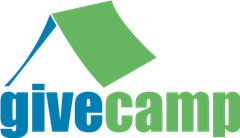
“Give Camp is a weekend-long event where software developers, designers, and database administrators donate their time to create custom software for non-profit organizations. The only limitation is that the project needs to be completed in one weekend.
During Give Camp, developers are welcome to go home in the evenings or camp out all weekend long. Meals, snacks and soft drinks provided the entire weekend (Friday afternoon through Sunday afternoon).”
Hope it is not raining that weekend. I cannot see too many people camping at the end of October but when have I been right?
GiveCamps are very popular in the US where a National GiveCamp day has been announced – yes you guessed 21st to 23rd October.
GiveCamp came from an idea of Chris Koenig, Developer Evangelist for Microsoft, as a way to try to channel the energy and passion of the local Dallas techie community towards something that would benefit local communities – the first GiveCamp was born under the name of “We Are Microsoft Charity Challenge Weekend” in January of 2008.
Forthcoming GiveCamps include:
- Pittsburgh GiveCamp – 07/15/11
- Charlotte GiveCamp – 10/21/11
- Orlando GiveCamp – 10/21/11
- UK GiveCamp – 10/21/11
I am not sure if the event will take place in London or somewhere else in the UK – future will tell. GiveCamp is also spelt two ways: GiveCamp or Give Camp. Do you know the correct spelling?
It is tough going back to work after a great weekend without a computer!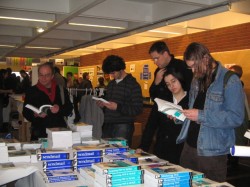
Just had a meeting where we discussed how to improve this blog. After a few bits of advice from my colleagues like “just get on with it”, we thought it would be a great idea to add a page where you can find out where I (and a selection of our books) will be during the next few months. The page, Events I’m Attending, is now up but I need to spend time adding the data. So please bear with me, you will know everything within the next few days. Do let me know what you think about this page – is it useful? Would you like more information?
I know I said previously that I would not show yet another photo of a table of books but I think this one is appropriate. Maybe you can tell me where and when it was taken?
 EuroPython is the largest European conference for the Python community, and in the following two years the conference will be held in Florence, Italy!
EuroPython is the largest European conference for the Python community, and in the following two years the conference will be held in Florence, Italy!
The conference will take place from Sunday June 20th to Sunday June 26th. The chosen location is Mediterraneo Conference Centre in Lungarno del Tempio, 44 – near the beautiful Piazza Santa Croce in the heart of Florence’s old city centre.
EuroPython Agenda will be as below:
- June 20th: Opening day of the conference. In the morning the keynote session will be held, with special guests soon to be announced.
- June 20th to 24th: Regular conference, with up to 5 parallel tracks from morning to evening, and 2 parallel tracks for hands-on trainings.
- June 25/26th: Coding Sprint. Two full days of quick hacking on Python core and libraries, with the guide of experienced developers.
Italian Track
Italy is home to a vibrant Python community that gathers together each year at the local PyCon Italia event (up to 400 delegates!). To acknowledge this reality in EuroPython and to encourage Italian pythoneers who suffer from the language barrier, we will hold an additional Italian track at EuroPython, containg only talks delivered in Italian.
EuroPython on your phone
All the juicy features for you smartphone geeks!
Enjoy EuroPython on your phone!
We are well aware that nowadays enjoying a conference goes through a superior mobile experience. This is why we have worked on providing specific support for our smartphone-powered attendees.
Special Partner Programme
Some fantastic events have been put into place – don’t be disappointed, book now:
Cruiser bike tour
Florence Centre with Dome
Wine tasting
Michelangelo, the Master
Oil, Cheese & Wine in Chianti Shire
Oltrarno district and its craftsmen
Pitti Palace and Boboli Gardens
S.Lorenzo district and food market
S. M. Novella Church, Pharmacy & District
Uffizi Gallery & Vasari’s corridor
Am I really going to work when all this is going on?
PyFiorentina: the legendary steak! (All together)
This year’s legendary gastronomic excursion in the land of steaks became European!
I have been there! Don’t miss it great atmosphere and great food. Places are going fast, so hurry up, book it now!
Contacts
We remind everybody that you can follow the updates on the conference both on the official Facebook page and on the Twitter profile @Europython.
For any further question:
- Contact the organizers: europython.eu/contacts/
- Submit a paper: europython.eu/conference/paper-submission/
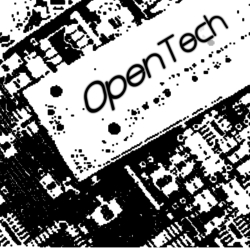 It’s over! OpenTech 2011 has been and was a great success.
It’s over! OpenTech 2011 has been and was a great success.
OpenTech is one of these events where you know you will always meet old friends of O’Reilly and by now my friends. All coming from different backgrounds but all from the technical community.
I could not go to the talks but there was a lot of laughing and clapping going on. For once, I think I would have been able to understand them. A lot of issues where discussed – What’s wrong and how can we improve our society. It might be better if I let you read the schedule as I am sure you will find good things there that you will want to be part of, or give you a nudge to start something of your own.
Among our friends there, I met with:
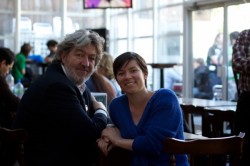 Bill Thompson, technology critic with fingers in many pies. You know that when the silent Converses approach, something worthwhile will be said. His talk: Building Digital Culture for Free: Can the Hacker Ethic and Commons-Based Peer Production make a better world? You can find the talk in Bill’s notebook.
Bill Thompson, technology critic with fingers in many pies. You know that when the silent Converses approach, something worthwhile will be said. His talk: Building Digital Culture for Free: Can the Hacker Ethic and Commons-Based Peer Production make a better world? You can find the talk in Bill’s notebook.
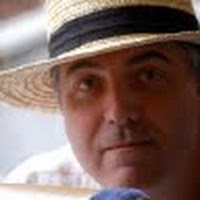 Dave Cross – Watching the Press but also as described on his Google profile “Perl hacker and database programmer. Trainer, writer and amateur genealogist”. Dave is the author of The Perl Template Toolkit and others. I am hoping that Dave will write a Perl article for this blog in the near future – Watch out!
Dave Cross – Watching the Press but also as described on his Google profile “Perl hacker and database programmer. Trainer, writer and amateur genealogist”. Dave is the author of The Perl Template Toolkit and others. I am hoping that Dave will write a Perl article for this blog in the near future – Watch out!
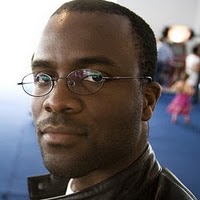 Adewale Oshineye, Developer Advocate at Google but also programmer, writer and photographer and author of Apprenticeship Patterns. It is always so nice to talk to Ade – he has the knack of boosting my morale and give me tips to improve whatever I do.
Adewale Oshineye, Developer Advocate at Google but also programmer, writer and photographer and author of Apprenticeship Patterns. It is always so nice to talk to Ade – he has the knack of boosting my morale and give me tips to improve whatever I do.
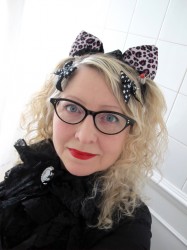 Rain Ashford – I love kittens… and Electromew. After 11 years at the BBC, Rain now devotes most of her time to the design and construction of electronic interactive artworks and wearables, for which she is available for commission, as well as consultancy in the realms of technology, arts and educational websites and interactive activities. What a programme! At OpenTech she talked and demonstrated – Hard curves, soft electronics – code, tech & textiles.
Rain Ashford – I love kittens… and Electromew. After 11 years at the BBC, Rain now devotes most of her time to the design and construction of electronic interactive artworks and wearables, for which she is available for commission, as well as consultancy in the realms of technology, arts and educational websites and interactive activities. What a programme! At OpenTech she talked and demonstrated – Hard curves, soft electronics – code, tech & textiles.
I don’t think I stopped chatting all day, I won’t name any names but you know who you are and it was great talking to you. My knitting made a very quick appearance but was dropped in no time.
Congratulations to Francis Bassey, the winner of the O’Reilly prize draw! Very good choice of books – Making Software and Open Government.
Goodbyes were made on the sounds of “See you in Florence“, “See you in Riga“.
![]() You guessed I went to UXLX, the User Experience Conference in Lisbon. 450 delegates came from 35 countries including Japan and South Korea, to listen to some of the best speakers in the field. These include some of our authors – Christian Crumlish (Designing Social Interfaces), Josh Clark (Tapworthy) and Louis Rosenfeld (co-author of Information Architecture for the World Wide Web).
You guessed I went to UXLX, the User Experience Conference in Lisbon. 450 delegates came from 35 countries including Japan and South Korea, to listen to some of the best speakers in the field. These include some of our authors – Christian Crumlish (Designing Social Interfaces), Josh Clark (Tapworthy) and Louis Rosenfeld (co-author of Information Architecture for the World Wide Web).
What is so good about this conference?
- It is truly international – all the talks are in English
- Throughout the day, there is a mixture of talks and workshops
- It also include 16 self-proposed talks. When the talk is agreed, during the 2 months period before the conference, the novice speaker is helped to deliver a good talk. These talks are usually about new developments and all the new exciting things that are not yet fully tried or catalogued.
- the venue – with a view on the Tagus and the Vasco da Gama bridge, is just brilliant
- Every evening the delegates are well looked after with pre-booked dinners and other social events. Even though I have some reservation about the menu of the first evening – “little crow’s thighs”, ” crow’s little hearts”, “hump” together with “little bottom sirloin” – should be very entertaining. You will not feel alone here!
One of the sponsors of the event is booking.com. Yes, they are still hiring, they need the following:
- Web Designer
- Front End Developer
- SEO Specialist
- Web Marketeer
- Consumer Psychologist
- Predictive Analyst
- iPhone Developer
- And of course Perl Developers (around 20 positions available).
Fancy moving to Amsterdam, getting a competitive salary + relocation package! Take a look at booking.com/jobs.
And finally…
 I am sure you don’ t want to see yet another picture of a table of books, so I thought Ishow you something completely different. I am staying in a hotel a few stations away from the FIL, where the conference is being held and only a 12 € taxi ride from the airport. I travel from Olaias to Oriente. On this run the Metro is amazing, so clean. The stations are tiled (walls and floors) in breautiful colourful designs – even though, it is underground, it feels light and airy. I will need to investigate the rest of the network to see if it is all so wonderful. Will let you know if I get chance to see more. Should you wish to see more pictures of Lisbon and Sintra, click here at your own risk.
I am sure you don’ t want to see yet another picture of a table of books, so I thought Ishow you something completely different. I am staying in a hotel a few stations away from the FIL, where the conference is being held and only a 12 € taxi ride from the airport. I travel from Olaias to Oriente. On this run the Metro is amazing, so clean. The stations are tiled (walls and floors) in breautiful colourful designs – even though, it is underground, it feels light and airy. I will need to investigate the rest of the network to see if it is all so wonderful. Will let you know if I get chance to see more. Should you wish to see more pictures of Lisbon and Sintra, click here at your own risk.


